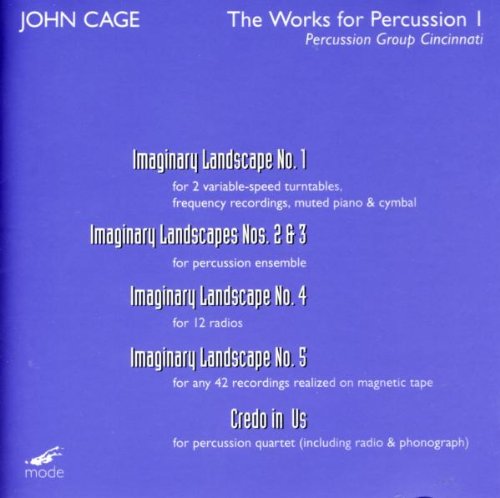CAGE The Works for Percussion Vol 1
Cage on ‘authentic instruments’ – not the only paradox in his percussion music
View record and artist detailsRecord and Artist Details
Composer or Director: John Cage
Genre:
Chamber
Label: Mode Records
Magazine Review Date: AW/2011
Media Format: CD or Download
Media Runtime: 61
Mastering:
Stereo
DDD
Catalogue Number: MODE229

Tracks:
| Composition | Artist Credit |
|---|---|
| Credo in Us |
John Cage, Composer
CCM Percussion Ensemble James Culley, Percussion John Cage, Composer Percussion Group Cincinatti |
| Credo in us (ver.2) |
John Cage, Composer
CCM Percussion Ensemble James Culley, Percussion John Cage, Composer Percussion Group Cincinatti |
| Imaginary Landscapes I - V |
John Cage, Composer
CCM Percussion Ensemble James Culley, Percussion John Cage, Composer Percussion Group Cincinatti |
Author: Philip_Clark
Of course, Cage’s percussion music has been recorded in spades elsewhere, but the boast on the back cover of this CD – “Cage on Original Instruments: the first modern recording to utilise Cage’s specified 78rpm test tone records played on variable-speed phono turntables (Imaginary Landscapes Nos 1 & 2), and 78rpm records (Credo in Us)” – turns out not to be an idle one. Yes folks, historically informed practice has reached John Cage; but such dedication from a label that for three decades has meticulously documented Cage’s music, and routinely re-evaluated habitual ways-of-doing, comes as no surprise.
I’d argue that no other Cage percussion disc reconnects us with the shock of how Cage questioned every cliché about music, and why people should want to create it, as powerfully. Credo in Us drops samples of “old school” classical music – Bernstein’s NYPO Shostakovich Fifth, then Beethoven, Tchaikovsky, Wagner and Suppé in a second realisation – into a cut-up of splintering percussion grooves and radio frequencies. Behind the animal physicality of Percussion Group Cincinnati’s performance, the message is clear: there’s no future in dead Europeans.
Credo in Us (1942) and Imaginary Landscape No 5 (1952) play with the thought that a score might be a collection of ideas about how to make a piece, rather than a set of formal instructions. No 5 uses the I Ching to determine how to collage pre-existing recorded sources; a first version uses period jazz recordings, a second edits Mode’s Cage catalogue: great! Imaginary Landscape No 4 (1951) for 12 radios sucks in pop music that’s very much of now. Be authentic and you’re of your time – that’s what that Cageian paradox says to me.
Discover the world's largest classical music catalogue with Presto Music.

Gramophone Digital Club
- Digital Edition
- Digital Archive
- Reviews Database
- Full website access
From £8.75 / month
Subscribe
Gramophone Full Club
- Print Edition
- Digital Edition
- Digital Archive
- Reviews Database
- Full website access
From £11.00 / month
Subscribe
If you are a library, university or other organisation that would be interested in an institutional subscription to Gramophone please click here for further information.




